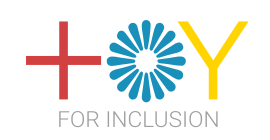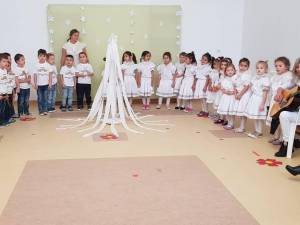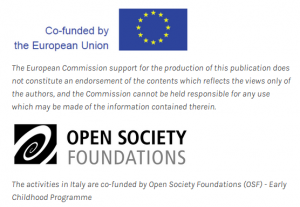A play centre for inclusion!
Acceptance, shared experiences, playful learning. For the little ones, together with the big ones, with the support of the local professional community - that's the play library.

Playing for inclusion: TOY for Inclusion programme
In 2016, the play centre opened its doors in Nagydobos. Since then, it has been open two days a week, snow, frost, sun, rain and is very popular with families. No one says: "I'm just going to the pharmacy, I'll leave the baby here, I'll be right back." Everyone knows by now that the Toy Library is not a childcare centre, but a place for playing, talking and learning together.
We have since started the second project, with the support of another donor and a slightly larger consortium.
In 2019, we also opened a play centre in Csobanaka. Our goal was the same:
- use play as a universal tool to support children's optimal development
- to create opportunities - mostly for the needy, but for all children and families in the community to play, talk, create and as children develop, they can experience community, belonging and their own individual identities.
An important aspect was the purchasing plan for the play centre, the opening hours, the programmes - in line with local needs and development objectives - those put together by experts, who are responsible for the physical, mental and spiritual health and development of children, their learning and their institutional education: the nurse, social workers, nursery and school teachers, school social workers and paediatricians.
A great team of enthusiastic professionals has been set up in Chobanka, joined by the local parents' association and the deputy mayor, who is himself a teacher. The programme is supported by the mayor, and the play centre is located in the community centre owned by the municipality.
The game centre is a integrated service system was set up, with a direct the nursery, the school, the classroom, supported by school social work and related social and health services. This will help local children to, Roma and non-Roma people with high quality, inreceive inclusive, formal and non-formal education, which enhances the future and educational opportunities of Roma children, and has a positive impact on majority children, as the experience of diversity and difference strengthens resilience, which is the basis for success in the 21st century.
Our project is international, so we use the knowledge sharing tool between countries regularly, we meet once a year and we always learn a lot from each other.
In the Game Centre, we also organise extra activities in addition to the regular games. For example, we have run Connected Parenting classes for parents, a story therapy process and a Your Story programme.
What else have we done during the TOY project?
- Training materials have been produced and training sessions implemented.
- We use a comprehensive training toolkit that guides professionals and volunteers through informal and formal early childhood education and care methods, always involving local communities
- We are creating play centres, which, in addition to concrete tools, also put methods at the service of the community
- We train trainers on how to set up play centres and organise their activities to strengthen the social inclusion of Roma children and communities.
- Trying out new community-based early childhood education and care methodologies
- We share knowledge.
- We are spreading the word and expanding
Meet the coordinators of the Toy Library in video!
Do you like the concept of the Game Centre and want to open one? Download our brochures with important and practical aspects:
Game centre cost analysis
Game Centre FAQs
Game centre impact analysis summary
Our materials are also available in English:
- Game Centre full impact analysis in English
- on the International Child Initiative website
- a REYN international site
- You can also download our English-language technical material, which we compiled during the previous project ITT.
Other important information about the project:
- Original title of the project/support programme : TOY to Share, Play to Care
- Project sponsored by Erasmus + Programme (KA3 Social Inclusion), Open Society Foundations (OSF)
- Duration, start/end of project: 31 January 2019 - 30 January 2021
- Total budget: EUR 635.828,00, of which EUR 499.995,00 is the EU grant, USD 134,754.00 is the OSF contribution
- Budget of Partners Hungary Foundation: 56,254.00 EUR
- The organisations implementing the project:
- International Child Development Initiatives - ICDI (Netherlands)
- International Step-by-Step Association - ISSA (Netherlands)
- Developmental
- Research Center for Pedagogical Initiatives Step by Step - DRCPI SBS (Slovenia),
- Open Academy Step by Step - OASS (Croatia,
- Centre for Education Initiatives - CEI (Latvia),
- Wide Open School - WOS (Slovakia),
- Associazione 21 Luglio (Italy),
- Partners Hungary Foundation (Hungary)
- Centre for Early Childhood Research at the Dublin City University Institute of Education (Ireland),
- Federation of Mediterranean Roma Associations - Akromfed, (Turkey)
- Salvation Army (Netherlands)
And that's how it all started:
Playbook for inclusion - stage 1
Community-based education and upbringing of Roma children
In 2016, the Toy Library opened its doors in Nagydobosos. The closing event of the first phase of our project is a milestone, from here we will move on to another level of cooperation, opening another Play Centre, for which the people of Nagydobosos provide the ammunition, knowledge and experience. Our intercultural mediators, parents, professionals, the municipal administration and last but not least the children's enrichment with playful experiences, the learning of traditional activities, the dialogue between older and younger generations, have paved the way for a more inclusive and cohesive local society. Play brings us together.

What have we done during the TOY1 project?
- Training materials have been produced and training sessions implemented:
- We have produced a comprehensive training toolkit, which guides professionals and volunteers through informal and formal early childhood education and care methods, involving Roma and non-Roma communities.
- A game library has been created, which puts methods at the service of the community, in addition to concrete tools
- We trained 12 trainers in partner countries, setting up a play library and organising its activities to strengthen the social integration of Roma children and communities.
- Community-based early childhood teaching and learning methodologies tried out
- We shared knowledge.
- We spread the word and expanded.
What are the results?
In the participating municipality of Nagydobos, the action group was formed, who are the local implementers and operators of the Toy Library: the municipality, the school, the kindergarten, the representatives of the Roma community. The leaders of the sessions were trained and the play library was set up. It is located in the kindergarten in Nagydobos, where members of the local community can participate in the joint play activities and borrow toys. The play library and the activities are coordinated by two local intercultural mediators who have been the driving force of the community since 2014.
Since the launch of the Game Libraries:
- 1700 children participated in play activities, 30% of them of Roma origin
- 77 workshops and outreach events, together with international partners
Read more about the programme in Hungarian and Romani:
FINAL 20180215LEAFLET_FINAL_HU_Romani
Download our other professional materials HERE
Other important information:
Project name: TOY for Inclusion: Community Based Early childhood Education and care (ECEC) for Roma Children
- Supporting organisation: European Commission DG Justice and Open Society Foundations
- Duration start/end: December 2016-2019 January
- Budget amount, currency: 48.683 EUR
- Partners:
International Child Development Initiatives - ICDI (Netherlands), project coordinator
International Step-by-Step Association - ISSA (Netherlands)
Open Academy Step by Step - OASS (Croatia)
Centre for Education Initiatives - CEI (Latvia)
Wide Open School - WOS (Slovakia)
Centre for Innovation in the Early Years - VBJK (Belgium)
Developmental Research Center for Pedagogical Initiatives Step by Step - DRCPI SBS (Slovenia)
Association 21 Luglio (Italy)[/vc_column_text][/vc_column][/vc_row]

